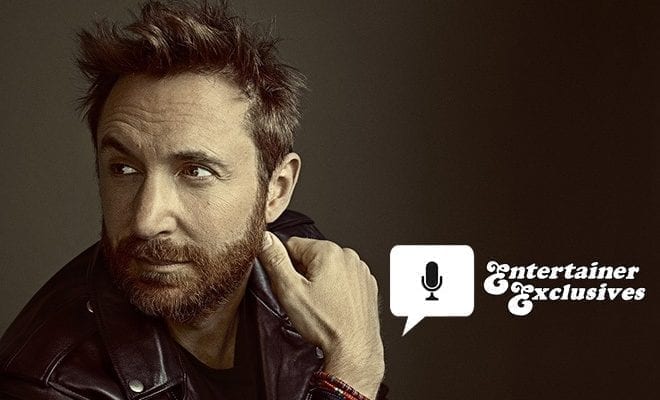 David Guetta credit Guerin Blask
David Guetta credit Guerin Blask
Music
Entertainer Exclusive Part 1: David Guetta Talks Hip Hop Culture and Lucky Number 7
David Guetta has become a music impresario, churning out beat banging, genre-busting pop songs that have been topping the charts for nearly a decade with mega-hits like Titanium featuring Sia; Where Them Girls At featuring Flo Rida and Nicki Minaj; Club Can’t Handle Me featuring Flo Rida; Who’s That Chick featuring Rihanna and I Gotta Feeling featuring The Black Eyed Peas. Guetta is the King of Collabs. His creative input on a song almost assures chart-topping status and his fans have dubbed his music, “Guetta-blasters,” an homage to his bold immersion into hip-hop culture, and his constant and effortless ability to blend hip-hop and pop music with an addictive beat.
Born in France to liberal intellectuals who shunned materialism, Guetta says he yearned for a more glamorous life, which he soon discovered in Europe’s underground club scene where he began deejaying as a teenager. He also fell in love with all things American, as he described, delving into American books, movies and music, and yearning to conquer the stateside music scene.
We sat down with David Guetta to discuss his seventh, yes seventh, studio album, simply titled, “7.” It’s an eclectic, genre-fluid collection of emotionally charged lyrics and hypnotic melodies. Of course, the album is full of Guetta’s famous collaborations with the likes of Sia, Jason Derulo, and Justin Bieber.

Credit: Joseph Aboud
AK: Was your creative vision, of merging electronic dance music with urban music, there from the start? Or did it evolve into that because of the opportunities that came your way?
DG: This may sound crazy, but when I was a kid and I began deejaying, there was no electronic music (laughs). When I was a teenager I was playing funk, and then I went to hip-hop and then house music. That’s why for me, it’s kind of natural because I come from this culture. Then I just moved to a different style, and one day I was able to merge them together. I love music, in general. I like to create emotions with my music, and I like to make people dance.
AK: You’re the first deejay I’ve seen that has been able to transcend, not just across various musical genres, but you have been able to get to the point where you’re considered a mainstream recording artist in your own right. How did you create this space for yourself that really didn’t exist before?
DG: Exactly! That’s what is so interesting to me. The world is a certain way, the music industry is a certain way, and if you want to be part of a certain “family,” you’re told, “This is the way things are done.” To me, you don’t have to follow those rules. I created my own rules. At that time, I was extremely criticized for this. And then everybody did the same. I want to create my own rules, basically. That’s how I have always been doing it, and that’s how I’m doing it now. I just finished my album (7, out September 14th), and it’s very eclectic.
AK: Yes, it certainly is. Every song on your new album has a completely different sound and emotional tone to it. From your perspective, is there anyone theme that ties the album together?
DG: This album is called 7. It is my seventh album, but the number seven also represents the end of a cycle; a week is seven days, the creation of the world in the bible is seven days and my birthday is on [November 7th]. That number is kind of magic to me. What I did with this album, we were talking about how I merged different styles in the past and created a new style of pop music. I wanted to go back to my roots and do a full pop album in different styles. I’m going to do a full electronic album that is completely going back to my roots and being completely underground. So basically, instead of compromising, I’m going to create those magic moments with an album that I could play in the festivals, in the clubs, and be able to have played on the radio. It came down to either being very pop or hip-hop for the radio or being underground again in the clubs. I wanted this album to be real. There is this one record that I really love, which was released in Europe, that is called Don’t Leave Me Alone. It’s one of my favorite albums. It’s pop, but it’s electronic and forward thinking, and it doesn’t sound like anything else out there. I also have Latin records and a huge record with Jason Derulo and Nicki Minaj.
AK: Is there a difference for you, when it comes to collaborating with male artists versus female artists? Do you take a different approach?
DG: Not really. Sometimes I will write with a male artist and we will have a female artist sing it. This happens a lot, or even the other way around. If you want to go higher in the notes, of course, you would do that with a female artist. Also, you’re not going to necessarily tell the same story in the music with a male artist versus female, even though things are changing, and I love this (laughs)! I think that things are a little bit less stereotyped right now.
AK: Tell me about this special creative synergy that you and Sia share?
Click here for our Entertainer Exclusive Part 2: David Guetta Talks Hip Hop Culture and Lucky Number 7
Photo Credits: Joseph Abound (album cover), Guerin Blask, Ellen von Unwerth
David Guetta’s seventh studio album, 7, is out September 14th. Pre-order on iTunes or click here . Follow him on Twitter @davidguetta.





0 comments